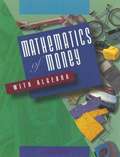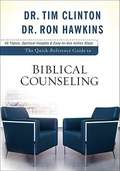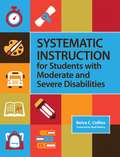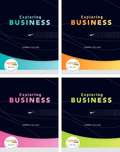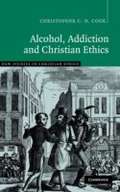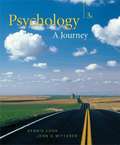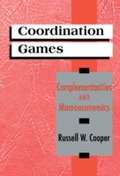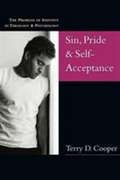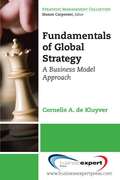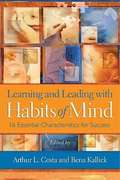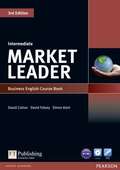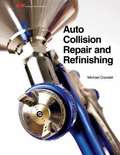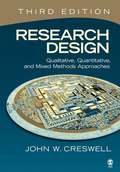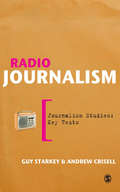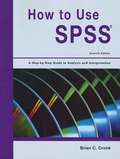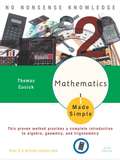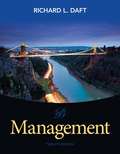- Table View
- List View
Marketing Yourself
by Dorene CilettiA portfolio is a collection of work samples that represent your abilities and accomplishments. It can be used to demonstrate your work readiness, show your eligibility for admission to a college or other organization, or showcase a special talent.
Mathematics of Money with Algebra
by Cheryl ClaytonMathematics of Money with Algebra will use and extend the skills you learned in Algebra I to help you manage your own finances
The Quick-Reference Guide to Biblical Counseling: Personal and Emotional Issues
by Tim Clinton Ron HawkinsBut sometimes those who are faced with helping the hurting could use a little more information about the problems people bring to them. The Quick-Reference Guide to Biblical Counseling provides the answers. This A-Z guide gives pastors, counselors, and everyday believers the information they need to help congregants, clients, and friends in a wide array of situations. The many issues addressed include Addictions Burnout Forgiveness Sexual abuse in childhood Worry Each of the forty topics covered follows a helpful eight-part outline and identifies typical symptoms and patterns, definitions and key thoughts, questions to ask, directions for the conversation, action steps, biblical insights, prayer starters, and recommended resources. Book jacket.
International Relations
by Close up Foundation StaffChanges in international relations--how countries relate to one another, how they work together, and how they conflict-- occur gradually and are the culmination of many complicated factors and events. However, some events in history are so monumental that they have come to represent years of progressive change. In the public's collective memory, the images surrounding these events may also come to symbolize the moment in time in which one era ended and the next began. Events from the Cold War and post-Cold War eras reflect this phenomenon.
Systematic Instruction For Students With Moderate And Severe Disabilities
by Belva C. CollinsTo ensure the best outcomes for students with moderate and severe disabilities, K 12 educators need to understand what constitutes good instructional practices and how to apply them in any classroom, with any curriculum. All the how-to guidance they need is in this accessible text on systematic instruction, a highly effective teaching approach rooted in applied behavior analysis. Developed by a seasoned educator who has trained thousands of teachers, this one-of-a-kind textbook fully prepares teachers to use systematic instruction procedures to link core content with critical life skills. Future educators will discover evidence-based methods that help them collect accurate screening and baseline data before instruction effectively use specific systematic instruction procedures make instruction more efficient by weaving non-targeted information into lessons improve students' communication skills through naturalistic language strategies expertly organize and deliver small-group systematic instruction enhance instruction with assistive technology plan successful instructional schedules for students across settings and teachers maximize instruction time by involving peers, paraprofessionals, and service delivery personnel help students maintain new skills and generalize them to other settings An ideal textbook for a wide range of teacher preparation courses, this student-friendly book includes sample lesson plans, chapter objectives, reflection questions, and a glossary. And the practical materials including 20 blank data collection sheets and quick step-by-step charts of instruction procedures make this an invaluable resource for in-practice educators. A comprehensive guide to the why and how of systematic instruction, this is the accessible text teachers need to succeed in inclusive classrooms and improve outcomes for students with moderate and severe disabilities.
Exploring Business
by Karen CollinsCollins is the only Introduction to Business book to teach students the topics of business through an in-depth study of a single company--Nike. How do you show your students the relationships between what they are learning in the classroom and what happens in the real business world? What happens when your students don't see the connections between the theory they are learning in the classroom and what is happening in the real business world?
Residential Hydronic Heating: Installation & Design (I=B=R Guide RHH)
by Air Conditioning Heating Refrigeration InstituteI=B=R Guide RHH, "Residential Hydronic Heating Installation & Design Guide," provides general information on the application and installation of hydronic water and steam systems for residential heating.
Alcohol, Addiction and Christian Ethics
by Christopher C. H. Cook Robin Gill Stephen R. L. Clark Stanley M. Hauerwas Robin W. LovinAddictive disorders are characterised by a division of the will, in which the addict is attracted both by a desire to continue the addictive behaviour and also by a desire to stop it. Academic perspectives on this predicament usually come from clinical and scientific standpoints, with the 'moral model' rejected as outmoded. But Christian theology has a long history of thinking and writing on such problems and offers insights which are helpful to scientific and ethical reflection upon the nature of addiction. Chris Cook reviews Christian theological and ethical reflection upon the problems of alcohol use and misuse, from biblical times until the present day. Drawing particularly upon the writings of St Paul the Apostle and Augustine of Hippo, a critical theological model of addiction is developed. Alcohol dependence is also viewed in the broader ethical perspective of the use and misuse of alcohol within communities.
Psychology: A Journey
by Dennis Coon John O. MittererIn a course where professors are frequently confronted by students who haven't actually read their textbooks, this text offers a solution. The shortest, most succinct of the books written by Dennis Coon, PSYCHOLOGY: A JOURNEY presents psychology in a way that sparks readers' curiosity, insights, imagination, and interest getting students "hooked" on psychology and eager to read on. The first author to integrate the proven SQ4R (survey, question, read, recite, relate, and review) active learning system into a psychology textbook, Coon helps readers grasp major concepts, develop a broad understanding of psychology's diversity, and see for themselves how psychology relates to the challenges of everyday life. Because readers become actively involved with the material, they develop a basic understanding of psychology that they take with them into their future courses and careers.
Economics: Theory Through Applications
by Russell Cooper A. Andrew JohnThis textbook, Economics: Theory Through Applications, centers around student needs and expectations through two premises: ... Students are motivated to study economics if they see that it relates to their own lives. ... Students learn best from an inductive approach, in which they are first confronted with a problem, and then led through the process of solving that problem. Many books claim to present economics in a way that is digestible for students; Russell and Andrew have truly created one from scratch. This textbook will assist you in increasing students' economic literacy both by developing their aptitude for economic thinking and by presenting key insights about economics that every educated individual should know.
Macroeconomics
by Russell Cooper A. Andrew JohnThis book studies the implications of macroeconomic complementarities for aggregate behavior. The presentation is intended to introduce Ph. D. students into this sub-field of macroeconomics and to serve as a reference for more advanced scholars. The initial sections of the book cover the basic framework of complementarities and provide a discussion of the experimental evidence on the outcome of coordination games. The subsequent sections of the book investigate applications of these ideas for macroeconomics. The topics Professor Cooper explores include: economies with production complementarities, search models, imperfectly competitive product markets, models of timing and delay and the role of government in resolving and creating coordination problems.
Sin, Pride and Self-Acceptance: The Problem of Identity in Theology and Psychology
by Terry D. CooperWhat is at the root of the problem of humanity? Is it pride or lack of self-esteem?Do we love ourselves too much or too little?The debate about the human condition has often been framed this way in both theological and psychological circles. Convictions about preaching, teaching, marriage and child rearing, as well as politics, social welfare, business management and the helping professions, more often than not, fall on one side or the other of this divide. With theological and psychological insight Terry D. Cooper provides trenchant analysis of this centuries-long debate and leads us beyond the usual impasse. Humanistic psychology has often regarded traditional Christianity as its archrival in assessing the human condition. Cooper demonstrates how the Christian doctrine of a sinful and fallen humanity sheds light on the human condition which exhibits both pride and self-denigration. Bringing theological insights ranging from Augustine and John Calvin to Reinhold Niebuhr together with the psychological theories of Freud, Jung, Carl Rogers, Gerald May and Karen Horney, Cooper guides readers through the maze of competing claims to a resolution which affirms Christian conviction while critically engaging modern psychological theory. A model of the proper integration of Christian theology and the discipline of psychology,Sin, Pride & Self-Acceptance will be of special help to students and practitioners of psychology, pastoral counseling and clinical psychology.
Fundamentals of Global Strategy
by Cornelis A. de KluyverThis book looks at the opportunities and risks associated with staking out a global competitive presence and introduces the fundamentals of global strategic thinking. We define crafting a global strategy in terms of change: how a company should change and adapt its core (domestic) business model to achieve a competitive advantage as it expands globally. The conceptual framework behind this definition has three fundamental building blocks: a company's core business model, the various strategic decisions a company needs to make as it globalizes its operations, and a range of globalization strategies for creating a global competitive advantage. A business model is defined in terms of four principal components: (a) market participation--who its customers are, how it reaches them and relates to them; (b) the value proposition--what a company offers its customers; (c) the supply chain infrastructure--with what resources, activities and partners it creates its offerings; and finally, (d) its management model--how it organizes and coordinates its operations. Globalization requires a company to make strategic decisions about each component of the business model. Market participation decisions include choosing which specific markets or segments to serve, domestically or abroad; what methods of distribution to use to reach target customers; and how to promote and advertise the value proposition. Globalization decisions about the value proposition touch the full range of tangible and intangible benefits a company provides to its customers (stakeholders). Decisions about a company's value chain infrastructure deal with such questions as, What key internal resources and capabilities has the company created to support the chosen value proposition and target markets? What partner network has it assembled to support the business model? How are these activities organized into an overall, coherent value creation and delivery model? Finally, strategic decisions about the global management dimension are concerned with a company's choices about a suitable global organizational structure and decision-making process. We use Pankaj Ghemawat's well-known "AAA Triangle" framework to define three generic approaches to global value creation. Adaptation strategies seek to increase revenues and market share by tailoring one or more components of a company's business model to suit local requirements or preferences. Aggregation strategies focus on achieving economies of scale or scope by creating regional or global efficiencies; they typically involve standardizing a significant portion of the value proposition and grouping together development and production processes. Arbitrage is about exploiting economic or other differences between national or regional markets, usually by locating separate parts of the supply chain in different places.
Learning and Leading With Habits of Mind: 16 Essential Characteristics for Success
by Arthur L. Costa Bena KallickIn Learning and Leading with Habits of Mind, noted educators Arthur L. Costa and Bena Kallick present a comprehensive guide to shaping schools around Habits of Mind. The habits are a repertoire of behaviors that help students and teachers successfully navigate the various challenges and problems they encounter in the classroom and in everyday life. The Habits of Mind include: Persisting, Managing impulsivity, Listening with understanding and empathy, Thinking flexibly, Thinking about thinking (metacognition), Striving for accuracy, Questioning and posing problems, Applying past knowledge to new situations, Thinking and communicating with clarity and precision, Gathering data through all senses, Creating, imagining, innovating, Responding with wonderment and awe, Taking responsible risks, Finding humor, Thinking interdependently, Remaining open to continuous learning.
Intermediate Market Leader Business English Course Book
by David Cotton David Falvey Simon KentThis five-level course uses authoritative, authentic sources to explore topical business issues and builds the professional standard of language needed to communicate in the modern world of business.
Measuring Inequality: A Methodological Handbook
by Philip B. CoulterA social science handbook that comprehensively covers distribution in social science, inequality theory and the importance of distribution.
Auto Collision Repair and Refinishing
by Michael CrandellAuto Collision Repair and Refinishing details the latest collision repair and refinishing techniques, as well as more traditional repair procedures. It presents both the theoretical and practical aspects of collision repair and refinishing, preparing students for a fast-paced workplace that is becoming increasingly technical. This comprehensive textbook includes information on MIG welding, HVLP spray painting, paintless dent repair, low-VOC finishes, paint matching, structural frame repair, detailing, and flexible plastic component repair, and estimating. Detailed chapters on mechanical systems, such as brake systems, cooling systems, and restraint systems, allow students to recognize and repair common types of mechanical damage.
Research Design: Qualitative, Quantitative, and Mixed Methods Approaches
by John W. CreswellThe Bestselling Text is Completely Updated and Better than Ever Praise for the Third Edition I have used the older edition with great success. The new one is even better. -Kathleen Duncan, "University of La Verne" The Third Edition of the bestselling text Research Design by John W. Creswell enables readers to compare three approaches to research-qualitative, quantitative, and mixed methods-in a single research methods text. The book presents these three approaches side by side within the context of the process of research from the beginning steps of philosophical assumptions to the writing and presenting of research. Written in a user-friendly manner, Creswells text does not rely on technical jargon. He cuts to the core of what a reader needs to know to read and design research in part by showcasing ideas in a scaffold approach so that the reader understands ideas from the simple to the complex. Key updates to the Third Edition Presents the preliminary steps of using philosophical assumptions in the beginning of the book Provides an expanded discussion on ethical issues Emphasizes new Web-based technologies for literature searches Offers updated information about mixed methods research procedures Contains a glossary of terms Highlights research tips throughout the chapters incorporating the author s experiences over the last 35 years.
Radio Journalism (Journalism Studies: Key Texts)
by Andrew Crisell Guy Starkey"This is not another turgid guide to digital editing, writing for radio and the structure of a newsroom team. It is an ambitious and accessible study that combines a succinct narrative history of radio journalism with an analysis of its power in the public sphere. It describes the development of British audio broadcasting before locating it in an international context and contemplating the contours of the convergent future. Such ambition is often the prelude to failure. Instead, Starkey and Crisell have written a precious introduction to the theory, practice and purposes of radio journalism that will be very useful to serious students of the subject... This is a very good book." - THE (Times Higher Education) Radio Journalism introduduces key themes in journalism studies to explore what makes radio reporting distinctive and lay out the claims for radio's critical importance in the news landscape. With their extensive experience in radio production and academica, authors Guy Starkey and Andrew Crisell take readers on a tour through the past, present and future of radio broadcasting, from the infancy of the BBC in the 1920s up to the prospect of rolling news delivered to mobile telephones. Grounding each chapter in a survey of scholarly writing on the radio, they explore the connections between politics, policy and practice, inviting critical reflection on who radio professionals are, what they do and why. Putting theory and practice into dialogue, this book is the perfect bridge between unreflective production manuals and generalised media theory texts. Witty and engaging, Radio Journalism provides an essential framework for understanding the continuing relevance of radio journalism as a profession, set of practices and arena for critical debate. ks within particular types of journalism; a review of contemporary practices; social demographics; a comparative analysis of practices around the world; a summary of main conceptual approaches; an indication of future directions; recommendations for further reading. This strong organization resembles a template for a course outline. This is intentional because the series is aimed both at students and their practice-based lecturers, who often come straight from industry and need time to adjust to the academic environment... [The series] achieves its aim to bridge the sometimes too evident dissonance between journalism theory and practice... They successfully situate discussions about journalism in social and historical contexts. We see the faces of individual journalists, the circumstances of news production, the relationship with owners, the battle between the public service and the profit nature of news, the relevance of journalism work. The detailed account of the conditions under which newspaper, radio and alternative journalism is produced and performed make the Journalism Studies: Key Texts series mandatory reading for both journalism students and their lecturers' - Verica Rupar, Journalism Studies
How to Use SPSS Statistics: A Step-By-Step Guide to Analysis and Interpretation
by Brian C. CronkIBM SPSS Statistics is designed to perform a wide range of statistical procedures. As with any other powerful program for the computer, there are certain conventions and techniques that must be mastered for efficient use of the software and to obtain consistently correct answers. By providing detailed, step-by-step guidance illustrated with examples, this book will help you attain such mastery.
Legal Office: Concepts and Procedures
by Robert CumminsThis textbook-workbook is divided into three parts with seventeen chapters to provide the legal office assistant student with a logical frame of reference in the study of the basic concepts of the law.
Mathematics Made Simple (Sixth Edition)
by Thomas CusickThis book serves as a review of arithmetic, and an introduction to algebra, geometry, and trigonometry and probability.The exercises and answers in this book provide readers with opportunities to test their mastery of each topic in these common branches of mathematics.
Management (Twelfth Edition)
by Richard L. DaftMANAGEMENT, 12E readers gain the confidence to manage and develop the ability to lead with innovative solutions in today's rapidly changing business environment. Daft explores the emerging themes and management issues most important for managers in businesses today. Current and future managers learn to look beyond traditional techniques and ideas to tap into a full breadth of management skills. D. A. F. T. defines Management with the best in new and proven management competencies.
Blueprint Reading for Plumbers in Residential & Commercial (Blueprint Reading Series)
by Bartholomew D'Arcangelo Benedict D'Arcangelo J. Russell GuestBlueprint Reading For Plumbers provides instructional material for plumbing and pipe fitting students who must develop the ability to interpret trade blueprints and to plan the installation of the required plumbing. This is accompanied by reference to the Building Officials and Code Administrators (BOCA) plumbing code for pipe size and material as well as acceptable fittings and fixtures. This revision brings the study up to date in code, pipe and fitting materials, and in fixture designs.

